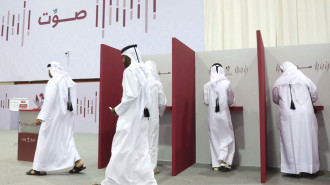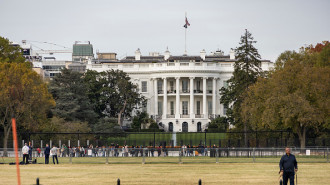Syrians wary after Iran's Raisi visit to Damascus as normalisation progresses
Iranian President Ebrahim Raisi's two-day visit to Syria this week has provoked ire from several Syrians who saw the visit as another step towards regional normalisation of the Assad regime.
Raisi visited Syria on 3 and 4 May, meeting with Syrian President Bashar al-Assad, where they "praised … the constructive communication between Syria and the Arab countries," an official readout from the Syrian Ministry of Foreign Affairs read on Friday.
The statement also made several pledges to enhance bilateral relations between the two countries, as well as condemned Western sanctions on Syria.
The visit came on the heels of a meeting in Amman which saw envoys from Saudi Arabia, Iraq, Egypt and Syria discuss how to re-integrate Syria into the regional fold.
Syria has been a pariah state since 2011 after its regime led a bloody crackdown on peaceful protesters, resulting in a 12-year-long civil war and at least 350,000 Syrians killed.
"[The meeting] is a counter-point to Arab countries' plan to normalise with the regime. Raisi wanted to show that Iran will have the upper hand in Syria," Suhail al-Ghazi, an Italy-based Syria analyst, told The New Arab.
Iran has been the Syrian regime's most generous benefactor throughout the civil war, lending it troops and weaponry and helping it organise militias to wrest control of the country from factions of the Syrian opposition.
States like Saudi Arabia and Jordan have taken issue with the Iranian presence in Syria, seeing it as a source of instability and a key part of the Syrian state's drug export industry.
"Iran has reached its limit. It created loyal forces and gave legitimacy within the state … but it can't sustain more than that and it needs to collect profit, so it will take steps that please Arab countries," al-Ghazi said.
Some Syrian civilians also looked at Iran's visit warily, fearing a regional convergence between Iranian and Arab Gulf interests.
"Any movement from the Gulf States is going to be against the Syrian people, 100%. Iran is acting in the same way as the Gulf since they are now on the same wavelength," Nasr, a Syrian speaking from Daraa under a pseudonym, told TNA.
Human rights organisations have warned states against reconciliation with the Assad regime, saying unconditional normalisation gives up crucial leverage needed to push for accountability.
Human Rights Watch (HRW) said on 28 February that "without pushing for reforms, Arab states risk endorsing and supporting the Assad government's widespread abuses."
On Sunday, a meeting will be held in Cairo to decide whether or not Syria will be re-admitted to the Arab League, a symbolic step after it was kicked from the pan-Arab body 12 years prior.
According to Jordan's Foreign Minister, it's likely that Syria will be re-admitted ahead of the upcoming Arab League summit in Riyadh, Saudi Arabia on 19 May.
"All of the countries are acting in their own interests. Unfortunately, we, as the Syrian people, no longer have any options," Nasr said.





 Follow the Middle East's top stories in English at The New Arab on Google News
Follow the Middle East's top stories in English at The New Arab on Google News


